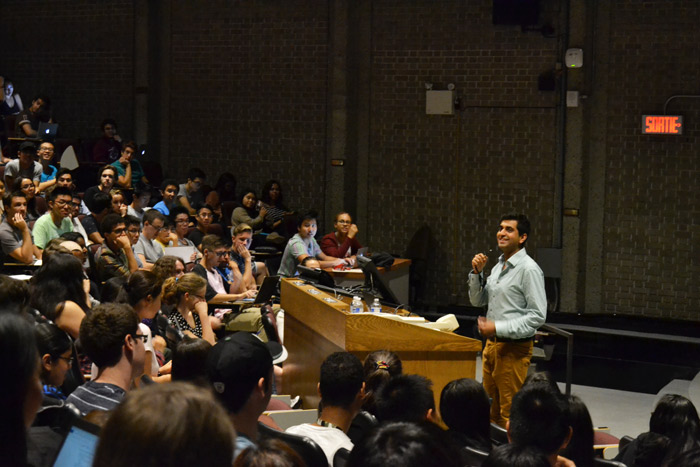Last Wednesday’s ‘So, you want to become a doctor?’ conference, organized by MedSpecs, spoke about the process of applying to med school. The presentations, which featured current McGill medical school students and alumnus, drew from personal experiences. The event began with, Guido Guberman Diaz, M1 McGill, who provided the audience with guidance on the medical application process.
“There’s no specific recipe to get into medical school,” he explained. “Try to excel in one particular area of interest and be at least acceptable at the rest. [Be] a jack of some trades and a master of one.”
In response to a student’s question about what extracurriculars to participate in, Diaz said that it is essential to pick an activity that is meaningful.
“Question everything you do to find the underlying importance for why you did it,” he explained. “If you can find no other answer than adding it to your CV then you should really reconsider doing it.”
For Diaz, finding meaning in his activities meant establishing a MedSpecs chapter at Concordia and conducting research during his undergraduate years—experiences he said he loved and grew from. Sharing these experiences is vital for those curious about the application process.
“It’s great to have medical students and doctors discussing their experiences and providing tips on how to succeed as a candidate,” explained Jacqueline Hsiao, U1 Science, who attended the event.
Nebras Warsi, who is currently in his third year at McGill medical school, was the second speaker. He likened applying to medical school to making food.
“There is a lot of different things going into it, but we can all agree there is never any one type of recipe that’s always the best,” he explained. “Sometimes you can put in a little bit more sugar, which could be GPA in this case. If you have a little less sugar, you can go for those glazed cherries which could be extracurriculars.”
Warsi explained that his experience shadowing a doctor at the Montreal General Hospital allowed him to grow as a person and exemplified the importance of experiences for the sake of self-discovery and learning.
The final presenter, Dr. Leah Feldman is a recent McGill medical school graduate and is currently a second-year resident practising family medicine. Feldman emphasized on how important it is to be passionate about what you do. She explained that as a doctor, she loves her job because of the lives she’s touched and the innumerable things she’s learned from her patients; however, because studying medicine is a long process, Feldman underscores that it’s important to understand the reasoning behind why a person wants to be a doctor.
For those who are uncertain about their dedication, this means making it through the first year of medical school, which tends to be a decisive period. Those who have chosen the profession for money alone often become overwhelmed, and drop out at this point.
“Most people have this idealization [about being a doctor] where […] you walk into the room, everyone is in a panic due to a code blue [and….] you save the patient’s life and go home in your Mercedes with a ton of money,” she said.
McGill medical school is unique because it gives clinical exposure to students from their second year; however, its intensity also makes it quite demanding.
“No matter if you’ve done a bachelors, masters, or PhD, it’s a ton of new information [in your first year] but it’s fun and [the professors] help you through it,” Feldman said.
After graduating from medical school, students will need to complete a residency. This can take from two to five years and is often followed by a fellowship that can take roughly three more years—another reason why Feldman encouraged prospects to really understand their motives behind becoming a doctor.
For those in attendance, the event helped assuage the fears of many.
“I had a different perception about medical school,” U0 Science student Irene Zhang said. “Now that I’ve heard the speakers talk, I’m [even] more motivated to apply to medical school.”
Full disclosure: Adrien Hu, co-president of MedSpecs, is the Copy Editor for the McGill Tribune.









